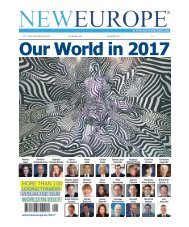OUR WORLD - Perspectives on Artificial Intelligence
You also want an ePaper? Increase the reach of your titles
YUMPU automatically turns print PDFs into web optimized ePapers that Google loves.
PERSPECTIVES ON ARTIFICIAL INTELLIGENCE<br />
of misinformati<strong>on</strong> is not illegal. Should<br />
we prohibit people from sharing private<br />
c<strong>on</strong>tent, the validity of which they cannot<br />
judge? Of course not.<br />
What we can demand and desperately<br />
need, however, is transparency, first of<br />
all for recommendati<strong>on</strong> systems – the<br />
artificial intelligence employed to govern<br />
c<strong>on</strong>tent. A Wall Street Journal report<br />
found extremist c<strong>on</strong>tent in a third of<br />
all Facebook groups. The groups were<br />
recommended to 66% of members by a<br />
Facebook algorithm. We have a societal<br />
right to know about and publicly debate<br />
these decisi<strong>on</strong> mechanisms. Meaningful<br />
transparency will be increasingly<br />
important in the future - just think about<br />
deep fakes – but it is already urgent.<br />
AlgorithmWatch, a Berlin-based NGO,<br />
has made c<strong>on</strong>crete proposals regarding<br />
researchers’ and investigative journalists’<br />
access to raw data.<br />
The mechanisms which currently<br />
c<strong>on</strong>trol our communicati<strong>on</strong> and<br />
significant porti<strong>on</strong>s of the basic<br />
informati<strong>on</strong> in public debate are a<br />
veritable black box. Independent<br />
researchers <strong>on</strong>ly have restricted access<br />
to data, with access to public applicati<strong>on</strong><br />
programming interfaces (APIs) being<br />
increasingly curtailed in recent years,<br />
leaving Facebook, YouTube and the like<br />
to use every psychological trick to exploit<br />
their knowledge m<strong>on</strong>opoly. As a society,<br />
we must put an end to this. We ought to<br />
be able to co-determine rules for digital<br />
opini<strong>on</strong>-forming marketplaces, based <strong>on</strong><br />
hard facts currently withheld from us by<br />
c<strong>on</strong>glomerates.<br />
I propose “Social Media Councils”<br />
as a model for public debate, similar<br />
to Citizens’ Assemblies in Ireland,<br />
comprising civil society, experts for<br />
freedom of expressi<strong>on</strong>, democracy<br />
and technology, and representatives of<br />
groups particularly affected by hatred<br />
and hate speech. They can trigger public<br />
debates based <strong>on</strong> evidence gained<br />
through transparency obligati<strong>on</strong>s,<br />
identify good and bad practice, and<br />
issue recommendati<strong>on</strong>s for acti<strong>on</strong> to<br />
politicians. Facebook and its internal<br />
ethics committee seek to privatise<br />
precisely this public debate. Facebook’s<br />
<str<strong>on</strong>g>OUR</str<strong>on</strong>g> <str<strong>on</strong>g>WORLD</str<strong>on</strong>g> | January 2021<br />
own internal appraisal of its practices<br />
is commendable, but in the l<strong>on</strong>g run a<br />
committee answerable to the CEO will<br />
never decide in society’s favour over its<br />
own boss’s business interests. That is<br />
why we need space for public reflecti<strong>on</strong>.<br />
Prominent Facebook critics such as<br />
Carole Cadwalladr, who exposed the<br />
Cambridge Analytica scandal, and Roger<br />
McNamee, early investor in Facebook<br />
and venture capitalist, have joined forces<br />
in the “Real Facebook Oversight Board” to<br />
publicise particularly dubious practices.<br />
Micro-targeting and targeted<br />
advertising, i.e. the disseminati<strong>on</strong> of<br />
advertising to very small target groups<br />
based <strong>on</strong> previously collected and<br />
collated data, must also urgently be<br />
banned. The resulting gigantic database<br />
with milli<strong>on</strong>s of highly detailed user<br />
profiles also enables misleading<br />
messages to be spread to especially<br />
ISTOCK<br />
susceptible users and is thus highly<br />
problematic. Moreover, Google and<br />
Facebook c<strong>on</strong>trol large secti<strong>on</strong>s of the<br />
ad-tech market, thereby c<strong>on</strong>stantly<br />
expanding their market shares to<br />
the detriment of European media<br />
outlets. Nowadays, press publishers’<br />
proceeds are also highly dependent<br />
<strong>on</strong> behaviour-based advertisement.<br />
However, the Dutch public broadcaster<br />
NPO has dem<strong>on</strong>strated that equally<br />
successful methods for c<strong>on</strong>text-based<br />
advertisement can exist without pers<strong>on</strong>al<br />
data or spying <strong>on</strong> and pursuing people<br />
via various websites and into their offline<br />
lives. A viable press financing model<br />
is needed to reinforce substantiated<br />
reporting as a foundati<strong>on</strong> of liberty and<br />
democracy, whilst not inadvertently<br />
weakening that very democracy<br />
through the unwanted disseminati<strong>on</strong> of<br />
misinformati<strong>on</strong>.<br />
33










